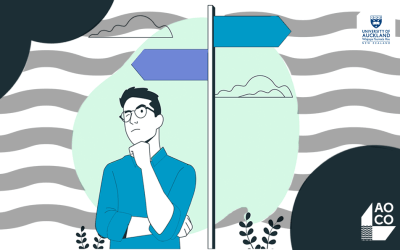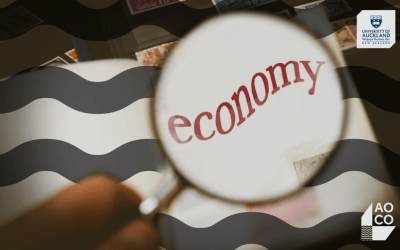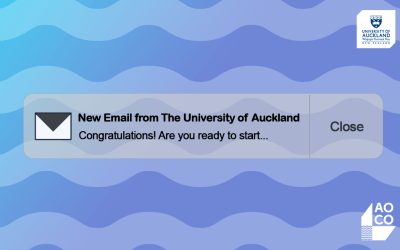Master of Education in Early Childhood (Online)
Shape the future of early childhood education in New Zealand Talk to an AdvisorApply NowMaster of Education in Early Childhood (Online)
Shape the future of early childhood education in New Zealand Talk to an AdvisorApply NowEDUCATION & SOCIAL WORK
MEd in Early Childhood
Entry Requirements
Undergraduate degree in Education with a GPA/GPE of 5.0 or higher*
*If you do not have the required prior study, you can still gain entry by passing 60 points towards the Postgraduate Certificate in Education in Early Childhood with a GPA of 5.0 or higher
Duration
Next Start Dates
2025
Semester 1:
3 March (Applications close 17 February)
Semester 2:
21 July (Applications close 7 July)
Full Programme Fees
$12,783.60
Why is this programme right for you?
The Master of Education (MEd) specialised in Early Childhood is designed specifically for early childhood educators, leaders, play and curriculum specialists, as well as dedicated professionals in other related disciplines.
As a MEd in Early Childhood student, you will be equipped with multidisciplinary knowledge and expertise, critical thinking skills, and the ability to advocate for diverse communities and stakeholders. This programme will empower you to seamlessly navigate a diverse spectrum of early childhood practice concepts, you will be sought after in different professional sectors and at world-ranked universities looking for promising doctoral candidates.
Take the first step towards becoming a transformative leader in Early Childhood Education. Your journey to making a significant impact starts here!
Apply today and transform your passion into positive change.
What are the key benefits?
1. Step into Leadership:
Prepare to elevate your career and take on influential leadership roles in early childhood education. This programme empowers you to go beyond traditional teaching, equipping you to advocate for diverse communities and affect change at the population level.
2. Broaden Your Impact:
Expand your advocacy skills across disciplines, learning how to apply your knowledge in policy, social work, and health services. Our comprehensive curriculum prepares you to create multidisciplinary solutions that enrich early childhood education and improve the lives of children.
3. Collaborate with Experts and Peers:
Join a vibrant community of professionals from various backgrounds — including policymaking, social work, health, and education. Engage in dynamic discussions and collaborate on innovative solutions to complex challenges in early childhood education alongside our esteemed academics.
4. Develop Cutting-Edge Research Expertise:
Stay at the forefront of modern early childhood issues, exploring the impact of global childhoods on curriculum and pedagogy. Gain insights into the role of digital technology and social media, and arm yourself with the necessary skills to engage with key agencies on pressing issues in the Early Childhood field.
5. Engage in International Research Opportunities:
Ranked 1st in New Zealand and 30th in the world in the field of Education, our graduates are highly sought after by leading universities for doctoral programmes worldwide. Through optional independent inquiries under expert supervision, you can contribute invaluable research to both Aotearoa and the global education community.
6. Elevate your Career and Make a Difference:
Gain a world-class education, hands-on experience, and a globally recognised Masters degree to enhance your career prospects and give you a competitive edge for career opportunities in New Zealand and internationally.
Programme Structure
Embark on your journey into the thriving sector of early childhood, a field calling for highly qualified individuals to drive progress and positive change in diverse services for tamariki and their whānau. The Early Childhood specialisation in the Master of Education ensures you will cultivate advanced expertise in psychology, leadership, child development, pedagogy, and contemporary perspectives on child development.
To meet the requirements of the Master of Education specialised in Early Childhood, the following six courses have been carefully selected to maximise your learning experience. Each course is taught across a 12-week Semester, entailing interactive online course engagement, as well as self-directed online learning. You will take one course at a time, and complete the programme in three years, all while you can continue to work.
*If you do not meet the entry criteria for this Master of Education in Early Childhood programme, there are pathway options available. Enquire now.
Course Code |
Course |
Description |
Points |
| EDUC 713 | Global Childhoods | Critically investigates existing and emerging problems in the field of global childhoods. Using theoretical perspectives at the forefront of critical childhood studies and early childhood education, this course develops highly specialised knowledge addressing questions such as: How are concepts, such as sustainability, technology, media, and pandemic, affecting concepts of childhoods? How do global childhoods impact on curriculum, pedagogy and education? | 30 |
| EDUC 742 | Child Development Psychology* | An advanced examination of theory and research in selected topics in child development. | 30 |
| EDUC 767 | Childhood Studies | An advanced study of childhood from a range of perspectives using interdisciplinary approaches of pedagogy, sociology, philosophy, psychology and other disciplines. Independent critical engagement with theories and constructs related to practices across a range of social sciences and humanities will provide students with specialist knowledge and skills to liaise with and inform key agencies of specific issues within the field. | 30 |
| EDPROF 709 | Early Childhood Leadership | A practice-focused course that introduces and critiques leadership theory and research in order to examine leadership beliefs and attitudes. Advanced examination of leadership in early childhood education from a range of perspectives. Will develop and strengthen leadership practices to improve outcomes for children, families and whānau. | 30 |
| EDPROFST 716 | Early Years Pedagogy | Critically examines pedagogy in the early years. How do theory and research inform pedagogy that enables effective learning in the early years? What is the relationship between pedagogy and effective teaching in the early years? What sort of teaching prepares very young children for life’s challenges and life-long learning? In what ways might early years pedagogy take into account an increasingly complex and diverse world? | 30 |
| EDPROFST 751 | Early Childhood Curriculum* | An educational curriculum negotiates social, political, educational and interdisciplinary ideas and theories. Critically examines influences on curriculum pertinent to pedagogical leadership in contemporary early childhood education. What perspectives of children, families and teachers are represented? How do these perspectives privilege particular outcomes? How does practitioner inquiry into curriculum issues underpin and improve practices? Requires the completion of independent research-focused assignments. | 30 |
Programme Structure
Embark on your journey into the thriving sector of early childhood, a field calling for highly qualified individuals to drive progress and positive change in diverse services for tamariki and their whānau. The Early Childhood specialisation in the Master of Education ensures you will cultivate advanced expertise in psychology, leadership, child development, pedagogy, and contemporary perspectives on child development.
To meet the requirements of the Master of Education specialised in Early Childhood, the following six courses have been carefully selected to maximise your learning experience. Each course is taught across a 12-week Semester, entailing interactive online course engagement, as well as self-directed online learning. You will take one course at a time, and complete the programme in three years, all while you can continue to work.
*If you do not meet the entry criteria for this Master of Education in Early Childhood programme, there are pathway options available. Enquire now.
EDUC 713 - Global Childhoods - 30 Points
Critically investigates existing and emerging problems in the field of global childhoods. Using theoretical perspectives at the forefront of critical childhood studies and early childhood education, this course develops highly specialised knowledge addressing questions such as: How are concepts, such as sustainability, technology, media, and pandemic, affecting concepts of childhoods? How do global childhoods impact on curriculum, pedagogy and education?
EDUC 742 - Child Development Psychology* - 30 points
An advanced examination of theory and research in selected topics in child development.
EDUC 767 - Childhood Studies - 30 points
An advanced study of childhood from a range of perspectives using interdisciplinary approaches of pedagogy, sociology, philosophy, psychology and other disciplines. Independent critical engagement with theories and constructs related to practices across a range of social sciences and humanities will provide students with specialist knowledge and skills to liaise with and inform key agencies of specific issues within the field.
EDPROF 709 - Early Childhood Leadership - 30 points
A practice-focused course that introduces and critiques leadership theory and research in order to examine leadership beliefs and attitudes. Advanced examination of leadership in early childhood education from a range of perspectives. Will develop and strengthen leadership practices to improve outcomes for children, families and whānau.
EDPROFST 716 - Early Years Pedagogy - 30 points
Critically examines pedagogy in the early years. How do theory and research inform pedagogy that enables effective learning in the early years? What is the relationship between pedagogy and effective teaching in the early years? What sort of teaching prepares very young children for life’s challenges and life-long learning? In what ways might early years pedagogy take into account an increasingly complex and diverse world?
EDPROFST 751 - Early Childhood Curriculum* - 30 points
An educational curriculum negotiates social, political, educational and interdisciplinary ideas and theories. Critically examines influences on curriculum pertinent to pedagogical leadership in contemporary early childhood education. What perspectives of children, families and teachers are represented? How do these perspectives privilege particular outcomes? How does practitioner inquiry into curriculum issues underpin and improve practices? Requires the completion of independent research-focused assignments.
*Our Programme Advisors will provide all official programme information, including regulations about entry, enrolment, course fees, examinations and requirements for degrees, diplomas and certificates as per the University Calendar. Courses are paid per Semester. Fees are set in advance of each calendar year and will be updated on this website. Fees are inclusive of 15% GST, but do not include the Student Services Fee, course books, travel and health insurance, or living costs. Amounts shown are indicative only. In addition to the tuition fees, there is a Student Services Fee of $4.44 per point (online). Fees will be confirmed upon completion of enrolment into courses
Master of Education in Early Childhood – Enquiry Form
What to think about when changing careers
If you’re feeling stuck in your job or you’re simply looking for a new challenge, a career change can shake things up and find your passion. But before you make the leap, here are a few things you need to think about!
The State of The Economy: Global Economy and New Zealand
New Zealand is a small open economy that is highly integrated with the global economy. This means that our economic performance is closely linked to the performance of our trading partners. In recent years, the global economy has been undergoing a period of...
The Future of Learning: A Glimpse into Auckland Online Short Courses
Embark on a journey of lifelong learning and personal growth with Waipapa Taumata Rau | The University of Auckland’s 100% online courses.




